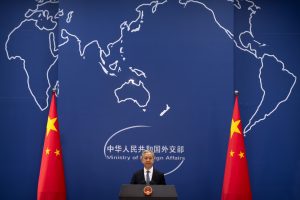At the entrance to 156 Mao Tse Toung Boulevard, a blue gate decorated with a Taoist symbol of good fortune greets visitors.
China’s embassy in Phnom Penh is getting ready to welcome a new occupant.
Wang Wenbin, a high-profile diplomat, will serve as the next ambassador to Cambodia. A former spokesperson for the Ministry of Foreign Affairs (MFA), the ambassador-designate is a known quantity in foreign policy circles. At his regular press conferences, Wang has delivered conciliatory as well as combative messages on China’s behalf. In February 2023, he described the downing of a Chinese “civilian unmanned airship” by the U.S. as “an abuse of force, act of hysteria, and overreaction.”
Wenbin’s zingers have made him an unlikely social media star in China. “Uncle, you work so hard, you are not afraid of facing the ‘hail of bullets’ fired at you by foreign media in the blue room, you defend our country, you are our hero!” wrote a fan in the aftermath of the “spy balloon” incident. When he was named ambassador to Phnom Penh, a few Weibo bloggers fretted that his “talent is wasted in an insignificant role.”
In the past decade, however, Cambodia has become China’s closest ally in Southeast Asia. The two countries are broadly aligned on issues relating to foreign policy and regional security. When China’s foreign minister visited Phnom Penh in April, Wang Wenbin spoke about their bilateral “strategic consensus.” The China-Cambodia relationship, he asserted, would “set a fine example for building a new type of international relations.”
Notably, the announcement about Wang’s posting came from CIDCA (the China International Development Cooperation Agency), a new organization created in 2018 to streamline the coordination of aid to countries participating in the Belt and Road Initiative (BRI).
Cambodia was one of the early adopters of BRI, President Xi Jinping’s signature foreign policy initiative launched in 2013. In a recent statement former Cambodian Prime Minister Hun Sen declared, “China’s BRI is the largest aid source for Cambodia’s physical infrastructure development, which is the backbone for our economic growth and national development.”
The Phnom Penh-Sihanoukville Expressway, which opened in November 2022, was the first large-scale BRI project in Cambodia. Built by the China Road and Bridge Corporation, the $2 billion roadway was financed by a concessional loan from the China Development Bank.
Last month, a section of Phnom Penh’s third ring road was officially renamed Xi Jinping Boulevard in honor of China’s president. Prime Minister Hun Manet, who presided over the ceremony, said Cambodia had added close to 4,000 kilometers of road and highways with China’s assistance. Manet said the newly named street would carry on a tradition that started with the inauguration of Mao Tse Toung Boulevard in 1965.
The Chinese Embassy in Phnom Penh called Xi Jinping Boulevard a “golden avenue of continuous inheritance of iron-clad friendship.”
China has been less forthcoming about non-BRI-related infrastructure upgrades. A newly constructed “angled deep-water pier” at Ream Naval Base was first spotted via satellite photo. According to one media report, the 363-meter docking site near Sihanoukville is “a near-replica” of a pier at China’s naval base in Djibouti and is sizeable enough to accommodate large ships including aircraft carriers. Carl Schuster, a former U.S. Navy officer and military analyst told CNN the renovated naval base “exceeds Cambodia’s present requirements, but its significance is more geo-strategic than purely military.”
The presence of two People’s Liberation Army Navy vessels docked at the new pier for the past six months, has fueled speculation that Beijing could use the facility as a base for future military operations. However, a spokesperson for Cambodia’s Ministry of National Defense told the Associated Press that the two Chinese corvettes were “not staying permanently.”
At an MFA press conference on December 7, a journalist from Agence France-Presse asked Wang a series of questions about the Chinese vessels docked at Ream base. He replied that the two countries shared a “profound friendship.” “As to the visit by Chinese navy ships I’d refer you to the competent authorities,” Wang added.

































